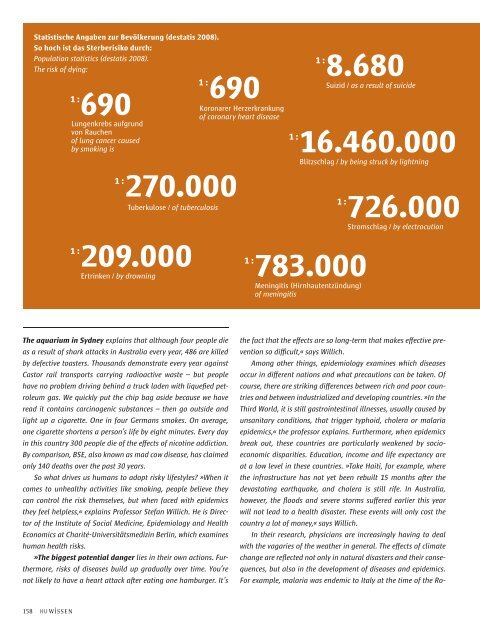hu wissen (pdf) - Exzellenzinitiative - Humboldt-Universität zu Berlin
hu wissen (pdf) - Exzellenzinitiative - Humboldt-Universität zu Berlin
hu wissen (pdf) - Exzellenzinitiative - Humboldt-Universität zu Berlin
Erfolgreiche ePaper selbst erstellen
Machen Sie aus Ihren PDF Publikationen ein blätterbares Flipbook mit unserer einzigartigen Google optimierten e-Paper Software.
The aquarium in Sydney explains that although four people die<br />
as a result of shark attacks in Australia every year, 486 are killed<br />
by defective toasters. Thousands demonstrate every year against<br />
Castor rail transports carrying radioactive waste – but people<br />
have no problem driving behind a truck laden with liquefi ed petroleum<br />
gas. We quickly put the chip bag aside because we have<br />
read it contains carcinogenic substances – then go outside and<br />
light up a cigarette. One in four Germans smokes. On average,<br />
one cigarette shortens a person’s life by eight minutes. Every day<br />
in this country 300 people die of the eff ects of nicotine addiction.<br />
By comparison, BSE, also known as mad cow disease, has claimed<br />
only 140 deaths over the past 30 years.<br />
So what drives us <strong>hu</strong>mans to adopt risky lifestyles? »When it<br />
comes to unhealthy activities like smoking, people believe they<br />
can control the risk themselves, but when faced with epidemics<br />
they feel helpless,« explains Professor Stefan Willich. He is Director<br />
of the Institute of Social Medicine, Epidemiology and Health<br />
Economics at Charité-<strong>Universität</strong>smedizin <strong>Berlin</strong>, which examines<br />
<strong>hu</strong>man health risks.<br />
»The biggest potential danger lies in their own actions. Furthermore,<br />
risks of diseases build up gradually over time. You’re<br />
not likely to have a heart attack a� er eating one hamburger. It’s<br />
158<br />
Statistische Angaben <strong>zu</strong>r Bevölkerung (destatis 2008).<br />
So hoch ist das Sterberisiko durch:<br />
Population statistics (destatis 2008).<br />
The risk of dying:<br />
1 :<br />
1 :<br />
690<br />
Lungenkrebs aufgrund<br />
von Rauchen<br />
of lung cancer caused<br />
by smoking is<br />
1 :<br />
209.000<br />
Ertrinken / by drowning<br />
690<br />
1 :<br />
270.000<br />
Tuberkulose / of tuberculosis<br />
Koronarer Herzerkrankung<br />
of coronary heart disease<br />
1 :<br />
8.680<br />
Suizid / as a result of suicide<br />
1 :<br />
16.460.000<br />
Blitzschlag / by being struck by lightning<br />
1 :<br />
783.000<br />
Meningitis (Hirnhautentzündung)<br />
of meningitis<br />
1 :<br />
726.000<br />
Stromschlag / by electrocution<br />
the fact that the eff ects are so long-term that makes eff ective prevention<br />
so diffi cult,« says Willich.<br />
Among other things, epidemiology examines which diseases<br />
occur in diff erent nations and what precautions can be taken. Of<br />
course, there are striking diff erences between rich and poor countries<br />
and between industrialized and developing countries. »In the<br />
Third World, it is still gastrointestinal illnesses, usually caused by<br />
unsanitary conditions, that trigger typhoid, cholera or malaria<br />
epidemics,« the professor explains. Furthermore, when epidemics<br />
break out, these countries are particularly weakened by socioeconomic<br />
disparities. Education, income and life expectancy are<br />
at a low level in these countries. »Take Haiti, for example, where<br />
the infrastructure has not yet been rebuilt 15 months a� er the<br />
devastating earthquake, and cholera is still rife. In Australia,<br />
however, the fl oods and severe storms suff ered earlier this year<br />
will not lead to a health disaster. These events will only cost the<br />
country a lot of money,« says Willich.<br />
In their research, physicians are increasingly having to deal<br />
with the vagaries of the weather in general. The eff ects of climate<br />
change are refl ected not only in natural disasters and their consequences,<br />
but also in the development of diseases and epidemics.<br />
For example, malaria was endemic to Italy at the time of the Ro-



